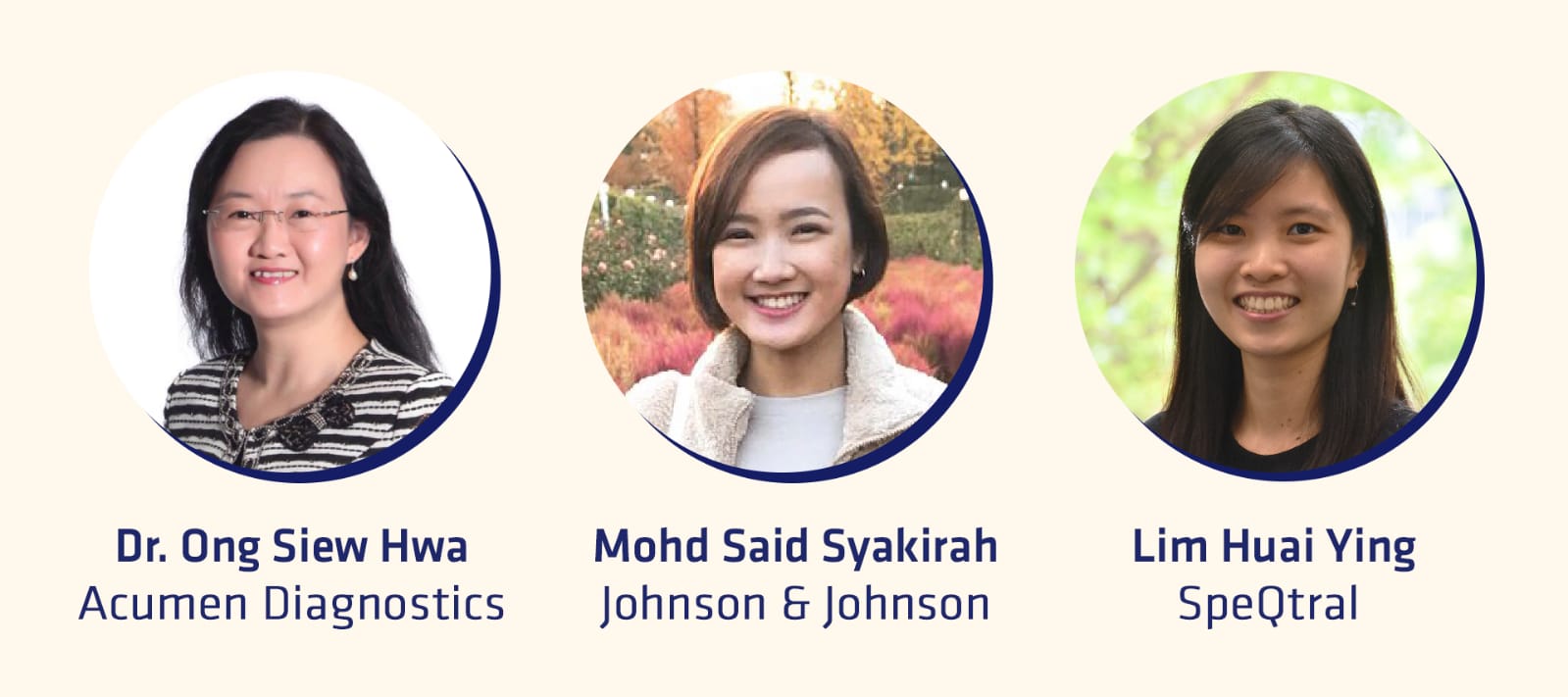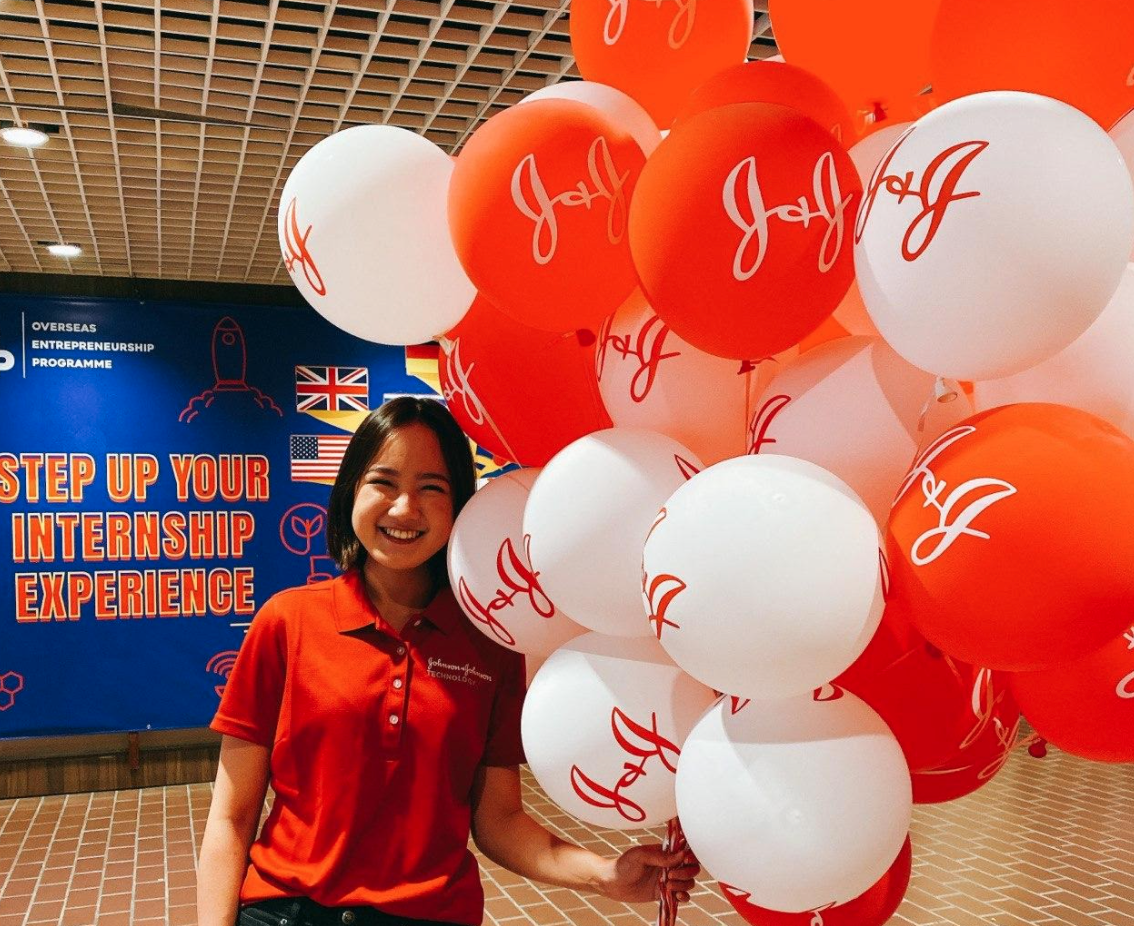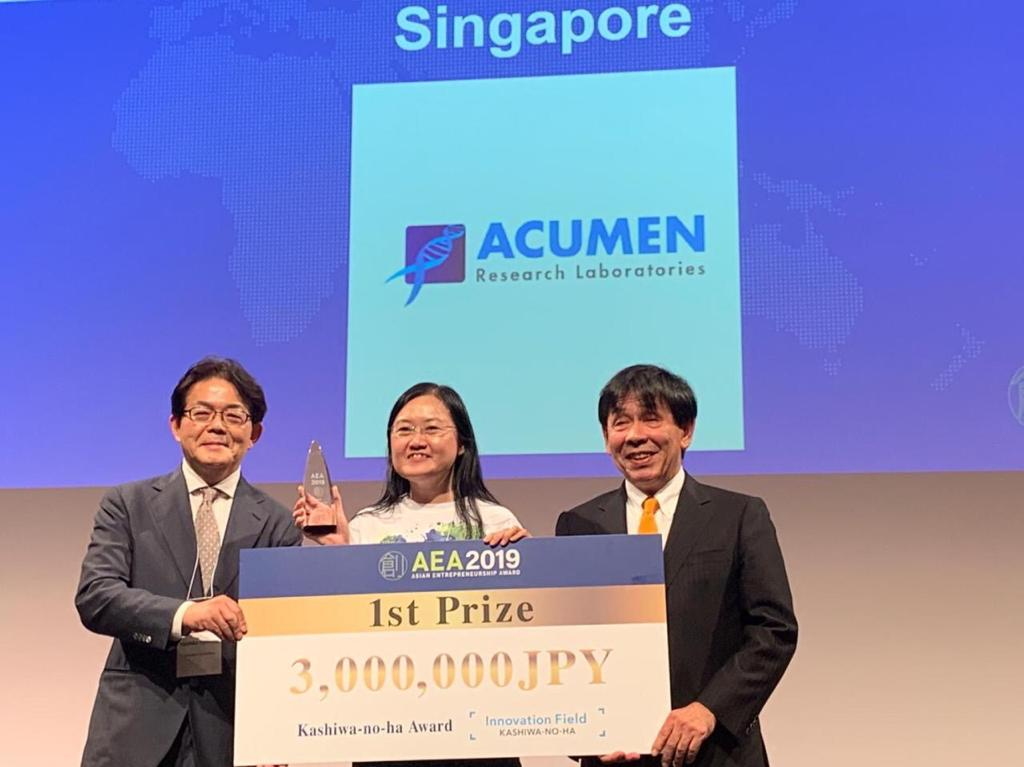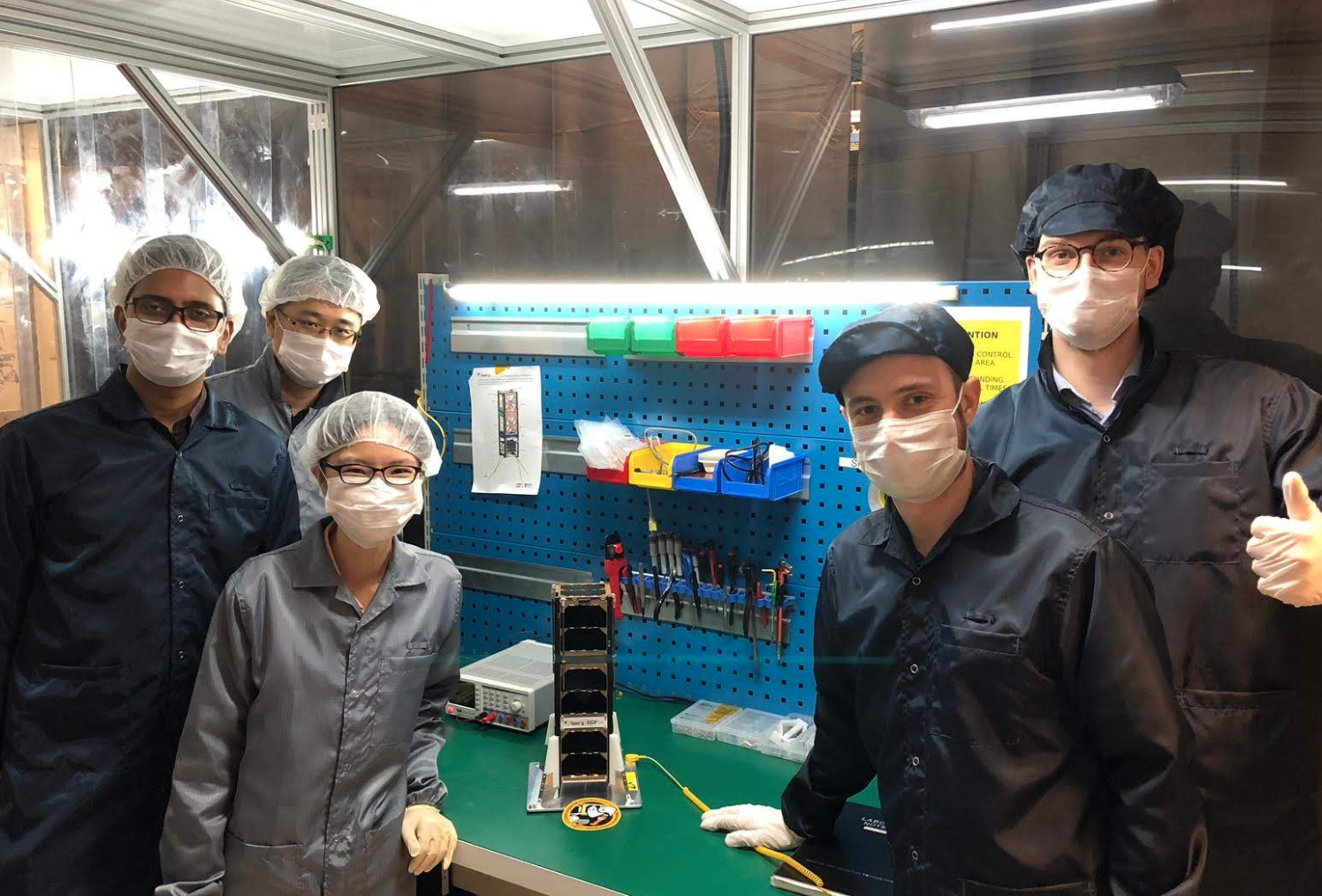Is the STEM (Science, Technology, Engineering, and Mathematics) industry really a man's world?
Today, perceptions are shifting and more needs to be said to accelerate gender parity. In celebration of International Women’s Day this March, we gathered three members from our Singapore Science Park community to share their experiences and perspectives to inspire individuals, and champion for a more gender-balanced world.

Say 'Hi' if you see them at Singapore Science Park :)
Q: Tell us about yourself and the work you do.
Dr. Ong: My name is Dr. Ong Siew Hwa, I'm 48 years old this year. Currently, I spearhead Acumen Diagnostics (previously known as Acumen Research Laboratories) taking on the role of CEO and Chief Scientist. Acumen Diagnostics is a medical technology company focusing on clinical testing of genetic and infectious diseases such as COVID-19, factoring of test kits and research & development (R&D).
Syakirah: My name is Syakirah and I’m 25 years old this year. Presently, I am under a 2-year rotational graduate program called the Technology Leadership and Development Program (TLDP) with Johnson & Johnson (J&J). In my current role, I work as an Enterprise Monitoring Analyst under the Technology Services team, monitoring and managing IT tools/services. Previously in my first rotation, I was an IT Business Analyst in the Supply Chain Technology team, managing the APAC ERP platform.
Huai Ying: I’m Huai Ying, and I am currently 28 years old. I work as a Mechanical Engineer at SpeQtral, a spin-off from the research group of Alexander Ling at the Centre for Quantum Technologies (CQT) at the National University of Singapore (NUS). We develop space-based quantum communication systems.

Syakirah at J&J’s Technology Leadership and Development Program recruitment drive held at Nanyang Technological University (NTU).
Q: Why did you pursue a career in the STEM industry?
Dr. Ong: I’ve always been a curious child so learning didn’t come as a chore. Along the way, my curiosity led me to discover Mathematics and Sciences. It was only in university where my fascination and passion truly sparked off. I found joy in understanding the workings and concepts behind medical science so learning about the subject became second nature. Eventually, I furthered my interests in PhD education and enjoyed every minute of it.
This year marks my 26 years in the biomedical field and it has been a great journey. Before the birth of Acumen Diagnostics, I’ve had the privilege of growing my track record working in academia, hospitals, and pharmaceuticals. The work involved doing R&D in genetics, cancer and infectious diseases on a global scale across Canada and the United States, as well as locally at A*Star to name a few.
Working in different settings helped build up my confidence and deep knowledge in the field. It wasn’t long before my aspiration outgrew the places I was at and after taking a year to brew, I knew Acumen Research Laboratories was the place where I could do scientific work the way I envisioned, to solve what I believed were important problems in an elegant, innovative manner.
Syakirah: I was fortunate enough to realise my passion and interest in IT at a rather early age. I have always been intrigued by how technology works, and enjoyed building and creating through programming. IT is an ever-evolving sector, which means there are various permutations when it comes down to career paths and specialisations. I was drawn to the myriad of possibilities and the fact that there will always be something new to learn.
Prior to graduation, I never expected myself to work in a tech role at a healthcare company. But I soon realised that in today’s world, technology spans almost all industries and plays a pivotal role in transforming businesses. Being in J&J, my work enabled me to interact with patients, doctors, nurses, consumers and customers, and the community at large. This made me realise the work I do isn’t only purposeful but translates into the greater good.
Huai Ying: My interest in physics dates back to high school. It was fascinating to me that a lot of our daily lives’ experiences can be explained by physics. It also does not require as much memorisation as biochemistry or the Arts & Humanities, which led to my decision to study engineering in university as I wanted to learn something more practical. Being someone who enjoys hands-on work, I had the opportunity to explore the nanosatellite programme during my time with NUS, which was offered under the Innovation and Design Programme (iDP). That was when my interest in space developed.
Fast forward to today, I now get to put theory into practice and thoroughly enjoy my work at SpeQtral. A typical day revolves around solving problems and working together with the team to develop quantum instruments that can be put into nanosatellites and launched into space. A big bulk of my work includes mechanical design and analysis, as well as assembly, integration and testing (AIT) of our instruments.
Q: Do you think STEM is a male-dominated industry? Were there any challenges you faced as a woman working in your company?
Dr. Ong: The truth of the matter is, it is very male dominant. Even in Acumen, without being biased, males make up the majority of our headcount and we are working to reach a balance.
As for challenges, I’d liken it to the progression of a project. In general, it requires a long time for any product or service to launch into the market. To deliver and sustain through from early-stage to completion requires a great length of time. And from what I’ve observed, the work often requires people who are well in their 40s equipped with a wide breadth of experience, network and deep knowledge to excel.
Therein lies an uneven playing field. Between genders, women tend to lose out on these qualities due to the social roles undertaken. Unlike men, women in motherhood will need to carve out time to raise a family. Also, it takes a strong-willed mentality to last long in the field as research work is often an arduous and solo task, working long hours in the lab. It’s almost like a monastery if I were to put it. To survive in such an environment, you have to be comfortable working independently and armed with grit to thrive and last long.
Syakirah: The representation of women is growing in the IT sector. We see the likes of Sheryl Sandberg and Susan Wojcicki who are now leading tech firms. Personally, the challenges I face has more to do with my internal thoughts than gender. Like many others, I suffer from imposter syndrome. It’s often a struggle to speak up or challenge norms but I am learning to step up and hone my self-confidence along the way.
Huai Ying: It is evident that females are a minority in the engineering field. Dating back to my schooling days even to work, I’ve always been the only if not another female in a project team. Perhaps it’s just a male-centric sector, where men tend to develop more interest in engineering work?
As for challenges, I wouldn’t account it to gender but towards the lack of deep knowledge due to my age. In the space engineering world, it is common to find yourself working among professionals who've been in the industry for long and have been working on projects that stretch across 5 years or more.

Dr. Ong at the Asian Entrepreneurship Award 2019 ceremony, representing Acumen Research Laboratories.
Q: Were there moments where you had to prove yourself because of your gender?
Dr. Ong: Well not for me, I never felt that way. This is where I think track record plays a big part. Firstly, in the technology space within the STEM field, your credentials are sufficient to prove your mettle. Secondly, the way you conduct yourself and interact with others will help to establish your presence and command respect from anyone, regardless of gender.
Syakirah: I am fortunate to be in teams where I wasn’t discounted because of my gender. But there were times when it does get intimidating being the only woman in the room. There were moments when I felt nobody could relate to what I was going through. Also, the way we communicate can be different and that’s not limited by gender. There have been studies proving how women tend to use passive language instead of active language, and for that - women, in general, will need to train themselves to use direct language to stand out.
Huai Ying: Not at all. I’ve not faced any discrimination. Being in space engineering can be technically demanding. Before I joined SpeQtral, I was fortunate to know the core team back when we were all under CQT. The experience of partnering up to solve problems together as a team allowed my skills to speak for myself.
Q: Do you think being female offers a different perspective/an edge over your male counterparts?
Dr. Ong: I feel it cuts both ways. Genetically, men and women are different. When it comes down to physical strength, disposition, views and approaches - these are all distinct to each gender. But there are cases where I find in certain contexts, having a female perspective does give an edge over males. In the political climate, there have been praises sung about how female leaders managed their country’s COVID-19 situation well when compared to other countries with male leadership in place.
Overall, genetics is just one factor. In the technology space, I’d believe that expertise is the equaliser along with hard work. Ideally, an individual takes on the traits of each gender i.e. strength from males and emotional intelligence from females to achieve a balanced approach in the way he or she works will be advantageous.
Syakirah: Definitely! Our background and biological makeup bring about new ideas and perspectives. Never undermine your views and be bold to share them. You’ll never know what you can bring to the table. I believe being in a diverse, inclusive environment sets the space for people to express themselves, regardless of gender.
Huai Ying: It’s a funny story, but there are advantages when you are a female engineer. Due to my petite frame and slender fingers, I’m often asked to assemble parts that are harder to reach by my male colleagues. There was once during a meeting we had with the investors, one of them even recognised me for being the ‘engineer with small fingers’! But well, apart from that, I do generally find that females tend to be more meticulous and pay better attention to details.

Huai Ying and her team members here assembling a nanosatellite.
Q: What do you think can be done to balance up the gender ratio in the STEM industry?
Dr. Ong: Outreach efforts and exposure to the industry is important. Providing access to females who are keen to explore a career in STEM will enable them to have a better understanding of the sector. Also, I believe having good childcare incentives as well as accessible amenities are key for females. Often, women have to take time off to care for their family and dependents. That said, a well-rounded benefits package plays a big part in providing the support women need.
Syakirah: In my opinion, it is important to bridge the talent gap by encouraging more young women to pursue an education and career in the tech space. Raising awareness about the varied opportunities available, and breaking the misconception that the industry is just about programming and coding is key. The field has so much more to offer, where one can become a consultant or solution architect and more.
Also, having more women in senior or leadership positions will help in perception shifts. Younger women like myself look up to them as role models. They show me that indeed, the glass ceiling can be broken and there is a space for women to rise and excel in the industry.
Huai Ying: For one, it is crucial to raise awareness about the industry - breaking the stereotype that engineering is a career reserved for males. In addition, based on what I have heard from others, I feel that there should be a better benefits package for females, especially mothers. Allowing more flexibility when it comes to working structure and understanding maternity needs will attract more females to the field. This will also encourage the younger female engineers to stay in their technical roles as they start their families.
Q: Lastly, do you have a word of advice to share with aspiring or fellow females in the industry?
Dr. Ong: To aspiring scientists, be prepared to chart new grounds and take on hardships. It won’t be an easy path, find a good role model and work hard with passion - it’s worth giving it a try! As for fellow females, I’ll say - don’t easily give up! Career success is a multi-factorial construct. It takes time, resilience, determination, coupled with passion and facing failures head-on, so do not give up.
Syakirah: Be proud to be a female in this male-dominated field! Instead of feeling inferior, know that you can bring new perspectives to the table. Also, be bold and learn to be unafraid to learn about what you do not know or what you are not good at.
Remember to play to your strengths and understand that certain traits do enable women to excel in the IT field. With various career opportunities to explore, there are definitely roles catered for any individual. As for me, I believe being the only female in the room is a step towards creating diversity and inclusion in the workplace and I’m proud it starts with me!
Huai Ying: Don’t worry and go after your passion! You never know what your passion will lead you to! Whatever that you’re interested in, even if it may be technically challenging like engineering, it is worth giving a shot. Universities will equip you with the skills you need to thrive. Lastly, know that female engineers are an awesome bunch. Keep up the good work!
Follow us on Facebook @SingaporeSciencePark and Instagram @yourWorkplaceCommunity, or even subscribe to our newsletter - your Workplace Community to receive latest updates on our tenant engagement activities.